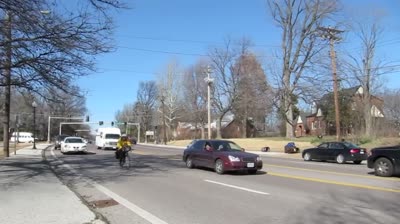So today, my daughter and I went to downtown Silver Spring to pick up our (Motorists) Bike to Work Day T-shirts. No problems on the way there. On the way back, this was part of our route:
On the way back, we took Sligo Creek Parkway, which is a very nice but narrow 25mph road with a bike path running next to it. We did not use the path because I wanted to get past Colesville Road without using the pedestrian crosswalks that cyclists using the bike path must use. Amusingly, as we passed Colesville Road (at point A on the map) one motorist started honking continuously for a good 30 seconds behind us (I enjoyed this) and then, as he passed, he yelled, "use the bike path!" I yelled back with the "Fuck off!" that I reserve for idiots when I have only time for a very terse phrase. I actually saw him flinch when I yelled it, so I think he heard me.
All of this happened as we passed this 'Bike Route, Share the Road' sign:
Until today, I had never been urged to use the bike path on Sligo Creek
Parkway. Under Maryland law, bike path use is not mandatory. I'm hoping that this sort of thing isn't a regular problem on this road, because in the summer of 2014 our commute to my daughter's middle school will take us on this road every day of the week.
A couple of minutes later, on the way north up Brunett Avenue (at point B on the map), a very quiet 30mph residential road, a cyclist approached in the oncoming lane and yelled "Use the sidewalk!" I yelled back, "No!" This took place about here:
I have never been urged to use the sidewalk by a cyclist before. While Montgomery County allows cyclists to use sidewalks, it is not required for anyone. Yes, I was cycling with a 10 year-old, but she is very competent on the road now. I can only assume that the cyclist in this case was not really a cyclist - (Motorists) Bike to Work Day is probably the only time he cycles, other than vacations, so he assumes that kids should always cycle on the sidewalk. This supports my theory that (Motorists) Bike to Work Day is not really a day for cyclists.
After we got home, my daughter asked me to cycle with her to school, so I caved. The original plan was to walk with her to school today (my pitiful way of protesting), but the kid got caught up in the energy downtown and she really wanted to bike to school. So I cycled with her to school as usual. The journey to school was uneventful.
So although I didn't mount my (Motorists) Bike to Work Day protest, I did have some adventures to do with motorist anger and incompetence.
In closing, I figure I'll repost an article that states how I feel today, but does it better and with less blood-pressure-raising.
From Jack R. Taylor's blog
Devil's Bicycle Advocate:
WASHINGTON DC— The
League of American Bicyclists (LAB)
announced today that it is beginning a campaign that the League hopes
will double the amount of bicycling being done by that organizations
40,000 members. The campaign will attempt to convince LAB members that
cycling can also be done on Saturdays. "We want to see our members out
there both days," said LAB spokesperson Patrick McCormick. McCormick
said that the League also hopes to expand its annual "Bike to Work One
Day" held each May, by asking members to individually commute a second
day, probably a nice cool day in the fall.












